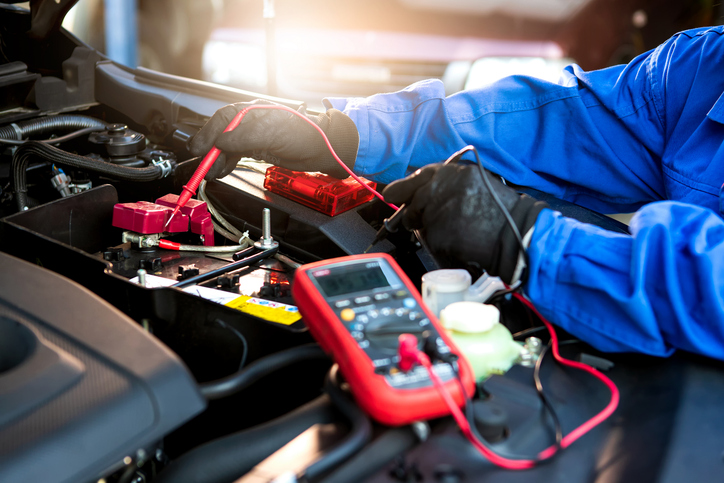Career Spotlight: What Does An Electrical Specialist Do?
Electrical systems are critical to every vehicle, from basic cars to high-end electric vehicles (EVs). As modern vehicles become more technologically advanced, the role of an electrical specialist after auto mechanic school has become increasingly important.
These specialists ensure that the complex electrical systems in vehicles are functioning properly, contributing to everything from safety to comfort and entertainment. For those passionate about automobiles and technology, becoming an electrical specialist for vehicles offers a promising and rewarding career.
What Does an Electric Specialist Do?
So, what does an electrical specialist do? Electrical specialists focus on the intricate electrical and electronic systems that make today’s cars run efficiently. Their responsibilities go beyond fixing broken lights or replacing fuses; they are involved in various tasks, including diagnostics, installation, and maintenance of electrical components. Here’s a closer look at their core duties:
1. Diagnosing and Repairing Electrical Issues
These problems range from simple issues like malfunctioning headlights to more complex problems with the vehicle’s computer systems or wiring. Specialists use advanced diagnostic tools to identify the source of the problem and then implement solutions. Whether dealing with traditional gasoline-powered cars or modern electric vehicles, their ability to troubleshoot electrical malfunctions is essential for keeping vehicles safe and operational.
2. Installing and Upgrading Electrical Systems
This can involve everything from installing advanced lighting systems and stereo equipment to more critical components like sensors, navigation systems, and battery management systems in electric cars. With the growing demand for connectivity and vehicle automation, specialists may also work on installing systems that support autonomous driving features and advanced driver-assistance systems (ADAS).
3. Maintaining Battery and Charging Systems in Electric Vehicles
The battery is the system’s heart in electric vehicles, and specialists must ensure it functions at peak performance. This includes checking for wear, ensuring proper charging, and troubleshooting any issues that may arise, such as a decrease in range or charging failures. Specialists also install and maintain charging stations in home and public charging locations.

4. Working with Vehicle Computers and Electronics
Today’s vehicles are essentially computers on wheels. Vehicle computers handle various tasks, from controlling engine performance to managing safety systems like airbags and antilock brakes. Electrical specialists are trained to work with these systems, performing software updates, reprogramming vehicle electronics, and fixing any issues related to vehicle computers. As vehicles become more autonomous and electric, the demand for specialists in this area will only increase.
5. Ensuring Safety and Compliance
Electrical specialists ensure that all electrical components comply with safety standards and regulations. This includes checking wiring, fuses, and circuits to prevent electrical fires or malfunctions that could endanger drivers and passengers. Their work directly impacts the reliability and safety of the vehicle, making attention to detail critical.
Skills and Qualifications Needed to Become an Electrical Specialist for Vehicles
Becoming an electrical specialist for vehicles requires a unique blend of technical knowledge, problem-solving skills, and hands-on experience. Here are some of the key skills and qualifications needed for success in this field:
1. Strong Understanding of Automotive Electrical Systems: A solid foundation in automotive electrical systems is essential for this role. Electrical specialists must understand the various components of a vehicle’s electrical system, including wiring, circuits, batteries, alternators, and more. They must also know how these systems work together to ensure the vehicle operates smoothly.
2. Diagnostic and Problem-Solving Skills: As you’ll discover in auto mechanic training, troubleshooting is a big part of the job, especially as vehicle electrical systems become more complex. Electrical specialists must be able to diagnose issues quickly and accurately using specialized tools and equipment. Once the issue is identified, they must develop and implement effective solutions.

3. Proficiency with Modern Tools and Technology: With the advancement of vehicle technology, electrical specialists must be proficient in using modern diagnostic tools, such as multimeters, oscilloscopes, and scan tools. These devices help specialists pinpoint electrical issues in both traditional and electric vehicles. They must also stay up-to-date with software updates and electronic systems to work with modern vehicles effectively.
4. Attention to Detail: Working with vehicle electrical systems requires high precision. A small error in wiring or installation can lead to bigger issues down the road, including safety risks. Electrical specialists must be detail-oriented, ensuring every connection, circuit, and component is installed and maintained correctly.
5. Knowledge of EV and Hybrid Technology: As the automotive industry shifts towards electric and hybrid vehicles, electrical specialists must be well-versed in EV technology. This includes understanding how high-voltage systems work, handling electric vehicle batteries safely, and troubleshooting issues related to the electric drivetrain.
Are you looking for a top-class auto mechanic school?
Contact ATC Montreal for more information.


